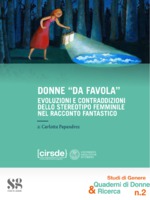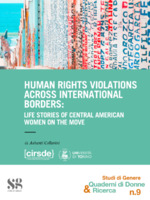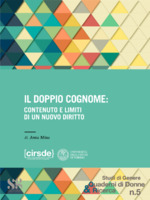Sfoglia documenti (13 in totale)
- Collezione: Studi di Genere. Quaderni di Donne & Ricerca
Sort by:
Donne "da favola". Evoluzioni e contraddizioni dello stereotipo femminile nel racconto fantastico
How has the image of the woman changed over time? Can we say that certain "old" stereotypes have lapsed?
In this analysis I’ve reflected about the theme, comparing some modern cinematographic revisitations and the corresponding written texts in the field of the fantastic genre, to understand if and how the female image (and not only) has changed from a century to another (in this case between the 19th and the 21st century).
The research has developed through the semiotic and gender studies, in order to analyze the diversities and the characteristics of the various texts observed (written and audiovisual) and to realize how the idea of feminine is changed and, maybe, evolved, proposing new type of characters (and also a new and complex dialogue with the masculine counterpart).
It emerges, indeed, the necessity to reflect on these stereotypes, on the modalities of development over time and on the difficulty that still today, despite certain changes, remains in thinking them (and thinking differently).
Because, in the end, what does it mean male and female? What makes us who we are?
Human rights violations across international borders: life stories of Central American women on the move
The essay documents and analyses the topic of violence in Central American migration, with a specific focus on migrant women in the current mobility regime South-North. We start by tracing the conditions that push women to undertake the migratory path in their countries of origin, more specifically in the Northern Triangle countries, that include Honduras, El Salvador and Guatemala; we then analyze the moment of transit, in order to highlight some of the great challenges that women incur in their path towards the destination country, being it Mexico or the United States; lastly, we shed light on the border-crossing experience and on some life stories in the context of arrival. Through this work we aim at demonstrating that the journey of Central American women is shaped by different forms of violence in every step of migration, and how the mobility and border regime is strongly compromised by the lack of application of a human rights approach. The personal contribution to this work is given by a fieldwork realized through eight qualitative interviews with experts in the field.
Il doppio cognome: contenuto e limiti di un nuovo diritto
The work aims to analyze the current legislation on the transmission of the surname to the children in the Italian legal system, to verify if this rule respects the principle of equality between the parents and the principle of the protection of the child's personal identity.
The rule of automatic transmission of the father's surname was indeed a glaring symbol of discrimination between parents, which reflected a deep-rooted background of inequality between men and women that can still be seen today.
The decision of the Corte Costituzionale n. 286/2016 stated that parents can give their child the surname of the father, followed by the surname of the mother if both are in agreement. Nevertheless, there are issues that a jurisprudential decision, even if crucial for the matter, cannot resolve. In fact, the judgment doesn't solve the question of the accumulation of surnames in future generations, and doesn't decide whether the children of the same family should have the same surname.
After a careful analysis of the issues that currently remained unresolved, hypotheses will be formulated to find solutions that are both respectful of the right of equality between parents and of the personal right of the child to have both branches of his family recognized in his surname. Lastly, the answers obtained from the interviews regarding the matter of the "double surname", in which several Italian municipalities participated, will be examined and will be subject to reflection.



